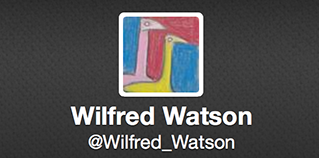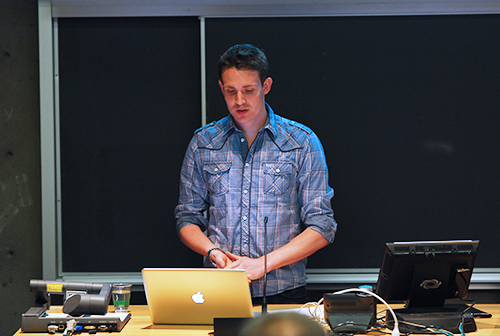Andrina Fawcett http://twitter.com/thecardigangirl
Nicholas van Orden, Paul Hjartarson and Harvey Quamen’s aptly named “I Tweet Dead People” was presented in partnership with EMiC as part of a larger panel this morning for the Canadian Society for Digital Humanities.
The project, which began primarily as a marketing tool, seeks to highlight scholarship that is being produced in relation to the Wilfred Watson Archive. As Nick van Orden put it, “we wanted to make previously unpublished material accessible to the public”. Wilfred Watson, Canadian author and playwright, was born in early 20th century England, and later relocated to Canada. Obtaining his B.A in English as a mature student, he continued his scholarship and won the Governor General’s award in 1955 for his collection of poetry entitled “Friday’s Child.” His wife, Shelia Watson was also a renowned Canadian author.
One primary concern for the team was the dilemma -- to bot, or not to bot? Several literary figures on Twitter have been automated, including the T.S Eliot (@TSElibot) account, but it was concluded by the @Wilfred_Watson team that in order to produce genuine interaction, adequately select and respect the material, and maintain a sense of direct association - automation was out of the question.
Ethical and logistical concerns are closely tied to the project. Despite a wish to include hashtags that relate Watson's content to current events and news, ethical concerns regarding whether or not he would have engaged in these topics continues to create contention. Other ethical concerns include, what are the politics of tweeting on behalf of the dead? Do scholars have room for intervention in the material they tweet? Should the Wilfred Watson account directly interact with the public? “In terms of interactions, we are not likely to engage with the local hair salon that follows us, but when someone like Daniel Powell of the scholarly community contacts us then maybe, but you don’t really want to put words in [Wilfred Watson’s] mouth that don’t come from the archive.”
“Imagine the time you put into your own personal Twitter or Facebook accounts, and now imagine the vast amount of time it takes to do those activities with extreme care for a historical figure” Nicholas van Orden commented. Every detail, down to the indecision between whether an arrow or ellipsis would better show continuity between tweets was considered, “we had to think of the tweets themselves as a representation of the physical” van Orden stated. “It is important that these tweets maintain a link to the physical that not only promotes the material, but invites people to come check out the archives to find this information for themselves.”
For more information on the project check out at @Wilfred_Watson or the EMiC website at http://editingmodernism.ca/
Nicholas van Orden preparing for the presentation.


